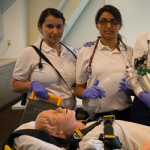Job Description
A Nutritionist is an important part of the healthcare field, especially when working in hospitals, home care facilities, and even nursing homes.
Many types of people require specific diets, and a Nutritionist is knowledgeable in the best foods to eat for every type of modification.
Duties
Some of the daily tasks of a Nutritionist will include:
- Work with clients to understand diet
- Provide insight on sleep habits, exercise, and stress levels
- Access health records of clients
- Educate others on diet
- Develop meal plans
- Evaluate and change meal plans
- Stay up to date on nutritional research
- Promote health and wellness
Salary
With the career of a Nutritionist, you can expect to have a yearly salary close to $36,608 on average.
Those who are in this salary range will make about $17.60 per hour.
When you just begin your career, you should expect a smaller salary as a Nutritionist, which may be around $13 an hour, or $27,040 per year.
Experience and time in the field will give you the most when it comes to your wages as a Nutritionist.
A Nutritionist with the most experience can average about $23 an hour, which comes out to $47,840 a year.
Annually National Average Salary: $74,770
Average Annual Salary by State
| State | Avg. Annual Salary |
|---|---|
| Alabama | $67,720 |
| Alaska | $84,150 |
| Arizona | $67,770 |
| Arkansas | $66,660 |
| California | $94,390 |
| Connecticut | $85,190 |
| Delaware | $75,060 |
| District of Columbia | $75,140 |
| Florida | $70,180 |
| Georgia | $74,970 |
| Hawaii | $80,380 |
| Idaho | $67,490 |
| Illinois | $69,570 |
| Indiana | $65,670 |
| Iowa | $69,240 |
| Kansas | $68,710 |
| Kentucky | $64,760 |
| Louisiana | $72,790 |
| Maine | $67,810 |
| Maryland | $84,080 |
| Massachusetts | $82,380 |
| Michigan | $75,740 |
| Minnesota | $74,420 |
| Mississippi | $61,780 |
| Missouri | $62,120 |
| Montana | $68,900 |
| Nebraska | $68,170 |
| Nevada | $73,930 |
| New Hampshire | $63,590 |
| New Jersey | $83,080 |
| New Mexico | $68,830 |
| New York | $80,500 |
| North Carolina | $66,540 |
| North Dakota | $67,840 |
| Ohio | $69,970 |
| Oklahoma | $65,810 |
| Oregon | $86,800 |
| Pennsylvania | $68,810 |
| Rhode Island | $74,880 |
| South Carolina | $67,590 |
| South Dakota | $64,210 |
| Tennessee | $63,030 |
| Texas | $67,100 |
| Utah | $61,000 |
| Vermont | $76,520 |
| Virginia | $75,440 |
| Washington | $81,140 |
| West Virginia | $69,050 |
| Wisconsin | $70,700 |
| Wyoming | $69,840 |
| Puerto Rico | $48,990 |
Annual Average Salary: Top 5 States
The top earning state in the field is California, where the average salary is $94,390.
These are the top 5 earning states in the field:
* Employment conditions in your area may vary.
How to Become: Step-by-Step
Step 1 Earn a Degree
The only way to begin your career as a Nutritionist is to earn a degree in the subject.
When considering a role as a Nutritionist, you’ll want to complete a relevant program such as Nutrition, Dietetics, Food and Nutritional Sciences, or Nutrition and Dietetics together.
The process of earning a bachelor’s degree will take about four years.
You can choose to enroll in an online school or complete your classes in person.
During your time at college, expect to take courses that include:
- Anatomy
- Human Nutrition
- Chemistry
- Food Science
While some states do allow you to earn an associate degree to work as a Nutritionist, you will need to possess a bachelor’s degree to complete licensure.
There are also some areas or employers that require a master’s degree to complete licensure to become a Registered Nutritionist.
Check with your state licensing board for any requirements needed so you are up to date.
Step 2 Gain Experience
Either during schooling or right after, you will be required to complete at least 1,000 hours of supervised Nutritionist work to gain licensure.
While working in this environment, you could shadow a senior Nutritionist or complete an internship to gain hands-on experience.
Some other ways to gain experience could include working at a food bank, volunteering at food service companies, or even completing internships in hospitals.
The work that you do should set you up for a career as a Nutritionist by teaching about healthy food choices, how different foods work for people’s bodies, and when and how to diet.
Step 3 Become Licensed
Once you have completed the required hours for licensure, it’s time to take the exam.
To become a Registered Nutritionist, you’ll need to sit for the national test.
The test is split into four sections, which include principles of dietetics, nutrition care, management of food and nutrition, as well as food service systems.
You’ll have about 145 multiple-choice questions to get through on this computer-based exam.
To pass, you will need to answer at least 125 correctly, then you will be considered a licensed Nutritionist.
After completing this exam, you will receive your licensure in the mail within four to six weeks.
Check with your state licensing board to ensure that this is the only exam and licensure that you need to work as a Registered Nutritionist.
Step 4 Continue Education
In states that only require a bachelor’s degree to become a Registered Nutritionist, you may want to consider completing a master’s degree after several years of working in this field.
A master’s degree is a great way to become proficient and also stay relevant in the world of nutrition.
It should take about two years to complete this type of degree, and many can be found online.
As a Nutritionist, you’ll need continued education throughout your working life due to changes in science, nutrition, and diet.
No matter how long you work as a Nutritionist, you will need to keep up with your education as well as licensure.
Every five years, you will be required to become recertified as a Registered Nutritionist.
Popular Programs
Education
Since working as a Nutritionist is an artful science, it is important to have a degree to show your knowledge.
Some states require an associate’s degree to begin entry-level careers in this field.
However, most Nutritionists will have a four-year bachelor’s degree that allows them to complete licensure in their state.
To get the most out of your degree, it is necessary to consider relevant programs, such as:
- Nutrition
- Dietetics
- Food and Nutritional Sciences
- Nutrition and Dietetics
- There are options throughout the United States to complete your degree online or in person.
- You’ll want to complete classes that are interesting and appropriate for the career that you want as well, which should include:
- Food Science
- Microbiology
- Chemistry
- Human Nutrition
Complete all of your classes and make sure that your program is accredited to go on to the next step in the process of becoming a Nutritionist.
During the time that you are earning your bachelor’s degree or shortly after, you will want to have some experience as a Nutritionist.
This can be done by volunteering, interning, or working in a variety of areas.
Supervised work experience is a requirement to become licensed, and you will need to have at least 1,000 in most states.
This can be done through working in soup kitchens, hospitals, schools, and much more.
After completing the supervised work experience, get in contact with your licensing board to see if you will need a master’s degree to become licensed.
If that is the case, it will take another two years to complete your degree and become licensed.
A master’s degree is another type of program that can be done online or in person.
This degree is a way to show proficiency in your field and can help you gain access to more critical careers as a Nutritionist.
Some employers require a master’s degree before allowing you to counsel others.
Video About The Career
Licensing & Certification
The law in most states is that you will need to have a license to work as a Nutritionist.
This is to ensure that you have all the education needed to help others on their health journey.
Before you begin, you’ll need to have either a bachelor’s degree or a Masters degree in some areas.
Check with your state licensing board to ensure that you have the right education to become licensed.
There are plenty of great Nutritionist boards to consider when completing licensure.
These include the National Association of Nutrition Professionals, the Clinical Nutrition Certification Board, and the National Commission for Health Education Credentialing.
The national test is what is required to become a Registered Nutritionist, and consists of 145 multiple-choice questions.
You can take this through your local college or one of the above-mentioned associations to get you on your way to becoming licensed.
It is also possible to find practice tests on the association’s websites to become familiar with the type of content on the exam.
However, the exam is split into four parts, which will be:
- Principles of Dietetics
- Nutrition Care
- Management of Food and Nutrition
- Food Service Systems
The associations require that you have at least 1,000 hours of supervised work experience before you can sit for this exam.
To pass the exam, you will need to answer at least 125 questions correctly.
You will need to complete re-registration every 5 years to be accredited as a Registered Nutritionist.
Along with this licensure, there are certifications that you can complete that may help you narrow down your niche as a Nutritionist.
You can become a Board Certified Holistic Nutritionist, Certified Nutrition Professional, Certified Clinical Nutritionist, and even a Certified Health Education Specialist with the help of the associations mentioned above.
To complete these credentials, you’ll need to take some classes and pass an exam.
It will take anywhere from six to eight weeks to receive your certificate or licensure.
Average Training Program Duration: 3-4 Years
Job Outlook
The career of a Nutritionist is expected to grow by over seven percent in the next decade.
This is faster than many occupations, and the reason for that is more people are becoming attuned to their nutritional needs.
Many older Nutritionists are expected to retire from the business, which will allow for new Nutritionists to join the ranks.
There will be over 5,000 new job openings for Nutritionists across the United States in the next ten years.
When considering this career, it may be wise to find employment in places that have a higher population of people, especially in areas that need the services of a Nutritionist.
Employment Growth Projection: 7%
2023
2033
That's a higher than average projected growth of 6,000
Should You Become a Nutritionist?
Overall Satisfaction: High

The career of a Nutritionist can be satisfying when helping others meet their nutritional goals.
Some Nutritionists feel as if they are not fairly compensated for their time, depending on how much they make yearly.
However, the ability to provide a necessary service to people gives this job a boost.
It does take a certain mindset to have success as a Nutritionist.
The work environment and balance between personal life and work is an incredibly satisfying part of this career as well.
Average Salary: Medium

The salary of a Nutritionist can vary depending on how long you have held your job and also where you work.
Those who are just beginning their career as a Nutritionist can expect to have a smaller salary of about $27,000 each year.
When you have experience and time in the field, the average Nutritionist should expect a salary closer to $36,608 in some areas.
At the height of your career as a basic Nutritionist, you’ll see a yearly salary closer to $48,000.
Job Growth Outlook: Medium

Nutritionists are needed more so than ever, and that will continue to be the case over the next ten years.
If you are considering this career, expect to see a growth of about seven percent.
This is due to retiring Nutritionists, meaning that there will be more job openings near you.
The rate of growth for a Nutritionist is higher than many other careers in the same field.
More people are becoming aware of their diets and how to eat to change their lives.
Education Duration: 3-4 Years

Employers typically look for Nutritionists who have at least a bachelor’s degree to work.
A bachelor’s degree requires a four-year commitment at most universities.
You can find programs that are appropriate for a Nutritionist online as well as in person.
Some of the programs that you may want to look into for this career are Nutrition, Dietetics, Food and Nutritional Sciences, and Nutrition and Dietetics.
Along with a bachelor’s degree, you will likely need certification in most careers.
Personal Skills Needed

A Nutritionist is someone who speaks with clients and helps them meet dietary goals.
In this career, you will need to have compassion and good listening skills to help others.
Some other great personal skills that are required for success as a Nutritionist include:
- Problem-solving
- Organization
- Communication
- Teamwork
- Patience
- Decision making
- Non-judgemental
- Math knowledge
- Persuasion
- Time management
Working with different types of clients means that you will have to change how you interact with each one, so the ability to form relationships and find common ground is important in this career.
Frequently Asked Questions
How long do you have to go to school to become a Nutritionist?
In most areas, you’ll need to have at least a bachelor’s degree to work as a Nutritionist.
This is to ensure that you have the most knowledge available to you and a degree to show your credentials.
A bachelor’s degree is important and will take about four years to complete.
You can find bachelor’s degrees online or in person, depending on your preference.
Some employers will require certification, which can take another six months to a year to complete.
How much money does a Nutritionist make a year?
Most Nutritionists will make $36,608 per year on average, which is about $17.60 per hour.
Those who are just beginning their career as a Nutritionist will make closer to $13 an hour, or $27,040 per year.
When you have the highest credentials, you could make over $47,000 per year as a Nutritionist.
Nutritionists who work in larger cities with more clients may find that they have a higher salary.
What kind of education do you need to be a Nutritionist?
It is important to be well-educated to work as a Nutritionist.
That is why you will need to have at least a bachelor’s degree to find success in this career.
Plus, certification is important to show that you are accredited and have the most valuable credentials to work as a Nutritionist.
It should take anywhere from four to five years to become educated as a Nutritionist.
Are Nutritionists in high demand?
More people are becoming health conscious in today’s world, and that means that Nutritionists are in higher demand than ever.
The role of a Nutritionist has grown over the last decade and will continue to grow by about seven percent over the next ten years.
Those who are looking to become a Nutritionist should consider completing their education now and getting started right away.
What skills do you need to have to be Nutritionist?
First and foremost, you will need to understand nutrition and diets to find success as a Nutritionist.
Then, it is necessary to have good people skills and know how to communicate with all types of clients.
Time management skills, being personable, and adapting to different styles are all necessary for this career.
Along with that, you will need compassion, empathy, and decision-making skills.
More Medical Careers
| Career | |
|---|---|
 | Certified Nursing Assistant Working as a Certified Nursing Assistant is an entry-level role that will give you hands-on experience when you are ready to take the next step in your medical career. |
 | Dental Assistant Dental assistants help dentists to provide patient care, keep records, and care for the dental equipment. |
 | Dental Hygienist Dental hygienists take care of cleaning teeth to promote hygiene and help avoid cavities and gum problems. |
 | Dialysis Technician Dialysis technicians maintain and monitor dialysis equipment, and also act as primary caregivers for patients undergoing dialysis treatment. |
 | Dog Groomer Dog groomers attend to grooming dogs, usually at dog salons or big pet-related chain stores. |
 | Healthcare Administrator Healthcare administrators – also known as healthcare executives or health services managers – are responsible for the planning, direction, and coordination of medical and health services. |
 | Home Health Aide Home health aides provide home care to individuals who require assistance in their day-to-day living. |
 | Licensed Practical Nurse (LPN) Licensed Practical Nurses provide basic nursing care to patients and work with Registered Nurses and Doctors. |
 | Medical Assistant Medical assistants support the work of physicians, nurses, and other health professionals. |
 | Medical Biller and Coder Medical billers and coders manage, organize, and code various health information data. |
 | Medical Technologist Medical laboratory technologists collect bodily samples and conduct tests to analyze those samples. |
 | Medical Transcriptionist Medical transcriptionists go over voice recordings to convert them into written texts. |
 | Patient Access Representative The work involves helping people to orient themselves to the space and everything that is going on. |
 | Patient Care Technician Patient care techs work directly with patients helping them with daily activities and assist the medical staff by measuring and monitoring the patients' vital signs among other tasks. |
 | Pharmacy Technician Pharmacy technicians provide patients with medications through prescription or over the counter. |
 | Phlebotomist As a Phlebotomist, it will be your responsibility to take blood samples from patients and send them to the lab for further testing. |
 | Physical Therapist Assistant Physical therapist assistants provide physical therapy services to patients and aide to physical therapists. |
 | Professional Recovery Coach A professional recovery coach is a life coach who works with someone during their addiction recovery process. |
 | Radiation Therapist Allied health provisional who specializes in radiation oncology treatments. |
 | Registered Health Information Technician Registered Health Information Technician (RHIT) help store and verify accuracy of health records as well as analyze patient data. |
 | Registered Nurse (RN) Registered Nurses provide hands-on patient care in various settings, mainly hospitals, and clinics. |
 | Respiratory Therapist Respiratory therapists treat and care for patients who experience breathing difficulties. |
 | Sterile Processing Technician A sterile processing technician is a healthcare professional who is responsible for preparing, sterilizing, maintaining, packaging, and storing medical tools and equipment used in surgical and other medical procedures. |
 | Surgical Technologist Surgical technologists – also known as operating room techs – prepare operating rooms and assist doctors and nurses during surgical procedures. |
 | Vet Office Manager Veterinary office managers work to make sure that the daily operations run smoothly and efficiently at veterinary hospitals or veterinary clinics. |
 | Veterinary Assistant Veterinary Assistants work closely with Veterinarians to handle routine animal care. |
 | Veterinary Technician Veterinary Technicians assist veterinarians as well as diagnosing and treating animals, mostly in private clinics. |
 | EKG Technician EKG technicians test and monitor the cardiovascular system. |
 | EMT Trained emergency medical technician that arrives at the scene to provide medical services such as resuscitation. |
 | MRI Technologist MRI Technologists use a machine to scan the body and create a detailed image of the inside for doctors to analyze. |
 | Optician Opticians are technicians and salespersons at the same time who spends most of their day talking to customers, reading prescriptions written by doctors, and dispensing glasses and lenses. |
 | Ultrasound Technician Ultrasound technicians aid physicians in monitoring and diagnosing patients through the use of ultrasonic imaging technology. |
 | X-Ray Technician X-Ray Technicians are medical imaging professionals who use technology to visualize the inside of our bodies. |













